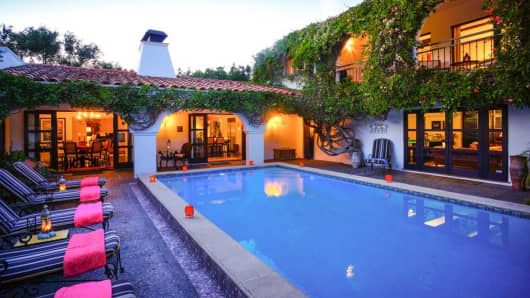Very simply, Airbnb is a catalyst for failure to comply with one law, rule or regulation after another (whether local, state or federal). While it requires hosts to represent and warrant that their listings don't breach condo, lease or rental agreements or homeowners' association pacts and that they comply with zoning and other applicable laws, Airbnb doesn't actively look for illegal listings.
It charges a percentage from hosts and renters, but it doesn't pay accommodation taxes. Under its terms of service, it doesn't require its accommodation members to adopt safety, privacy and cleanliness standards. It doesn't concern itself with accommodating those with disabilities.
Those terms of service, revised in April 2014, merely warn in bold text about laws that can penalize hosts for renting their place on Airbnb and also note to hosts that many cities have laws restricting short-term paying guests and leases and condo pacts may often bar the practice.
Unless an apartment happens to be located in a zoning district that permits transient occupancy and commercial use of a residential dwelling unit, then Airbnb could be aiding and abetting wrongful activity. Airbnb may be operating a continuing enterprise by effectively converting residential apartments into hotel rooms without a zoning variance or an occupancy permit.
Read More10 of Airbnb's most luxurious homes in the world
This, to me, appears similar to the accountability RICO statutes were designed to address involving leaders of crime syndicates before 1970, when the law was passed. In effect, the RICO act provides a means for leaders of a syndicate to be held accountable for the wrongful acts they influenced others to do.
RICO closed a perceived loophole that allowed crime bosses who benefited — and seemingly encouraged — illegal acts to be exempt from prosecution because they didn't actually commit them. While the nature of the activity targeted by RICO may be very different from that at issue with Airbnb, the need for structural accountability is not. Airbnb should not be allowed to turn a blind eye to the wrongful conduct it puts into play.
New York State's Attorney General Eric Schneiderman, for one, has taken notice. He issued a subpoena in October 2013 to crack down on hosts operating multiple listings, subletting their apartments for less than 30 days and evading taxes. Last October, he issued a report stating that 72 percent of units used as private short-term rentals on Airbnb in New York City appeared to violate state and local laws during the review period.
Read More Cities keen on 'sharing economy' but concerned about safety
Is Mr. Schneiderman the only watchdog out there? Who else is watching out for consumers and their safety? Does anybody care about the rights of businesses that follow countless regulations and spend millions to comply with them? Where is the Consumer Financial Protection Bureau? What about other lawmakers?
I always assumed a new business had to follow the rules. If not, then I've got a great idea. Let's start a "Liquor for Anyone" app. With it, a person of any age with this app could buy liquor at a deep discount and it would be delivered anytime, anyplace. We could offer cheap prices because we won't pay taxes. We would have a massive consumer base because we'll market to those under 21 years of age. Is there any doubt this could be worth billions? But it will never happen. Why not? Because liquor laws and regulations are actually enforced.
So tell me why Airbnb's situation is different? It shouldn't be, in my opinion.
For thousands of traditional lodging owners and hosts, there are potentially difficult times ahead as these hosting sites erode revenues and future business. What should be done? More city councils, state attorneys general and U.S. attorneys should look into Airbnb's practices. Lawmakers should seriously determine the legality of enterprises such as Airbnb and ensure that everyone is playing by the same rules.
Competition within an industry is a good and noble thing. But it needs to be fair. And right now, in my opinion, it's not. Not even close.
Monty J. Bennett is founder, chairman and CEO of the Ashford Group of Companies a provider of asset management and other services to the hospitality industry. He is also a Global Advisory Council member of HOFTEL, a worldwide hotel ownership group. Follow him on Twitter @MBennettAshford.


